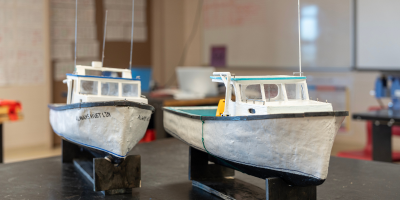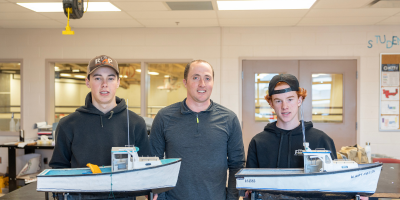New program helps students play an active role in their learning and prepare for the workforce

In Andrew Rowe’s class, students are busy doing hands-on activities, solving problems, and working on creative projects.
Rowe teaches Essential Skills Achievement Pathway (ESAP) at Montague Regional High School, a pilot program that gets students ready for jobs in a skills-based economy and helps them prepare for future work, learning and life.
“It’s not higher or lower than the typical graduation pathway, it’s just different,” explains Rowe.
“We all have unique interests and learn in our way, so it makes sense that our schools should have a variety of learning options.”
Students who have figured out their career goals can apply to the program in the second semester of Grade 10.
They spend half their day doing project-based learning in the essential skills classroom; community experiential learning and workplace opportunities; and the other half doing standard high school courses.
“We help them navigate through what a career in their area of interest might look like and work with them to create projects that encapsulate that. We also connect them with experts in the field so that they can begin to build working relationships in their communities.”
Shamus MacNeill is a student in Rowe’s class.
“I’ve always been interested in the fishing industry and know that it’s something I want to pursue after graduation, which is why I was interested in this pathway.”

Shamus built a radio-controlled boat during his time in the ESAP classroom. Complete with a wooden cabin, the design is a replica of his father’s boat.
He used math to create the boat to scale, learned how to work with fiberglass and solder metal to form mechanical and electric bonds.
“The hardest part was getting the bubbles out of the fiberglass and making the rest of the parts fit."
His hard work paid off, with a fully functional model.
“It was really rewarding to be able to sail my boat in the Montague River and steer it back to me on shore.”
Rowe is thrilled with the motivation shown by his students.

“The program allows learners to center their school experience around their interests, which keeps them engaged and helps with attendance.”
“It gives them a taste of the working world and opportunities they may not even have considered. Or if they’re passionate about a traditional skilled trade, ESAP allows them to get a jumpstart on their apprenticeship hours. It’s all positive.”
Rowe looks forward to the expansion of the program.
“ESAP is a great option for so many students. I’m excited to see the program evolve and continue to help more learners succeed.”
